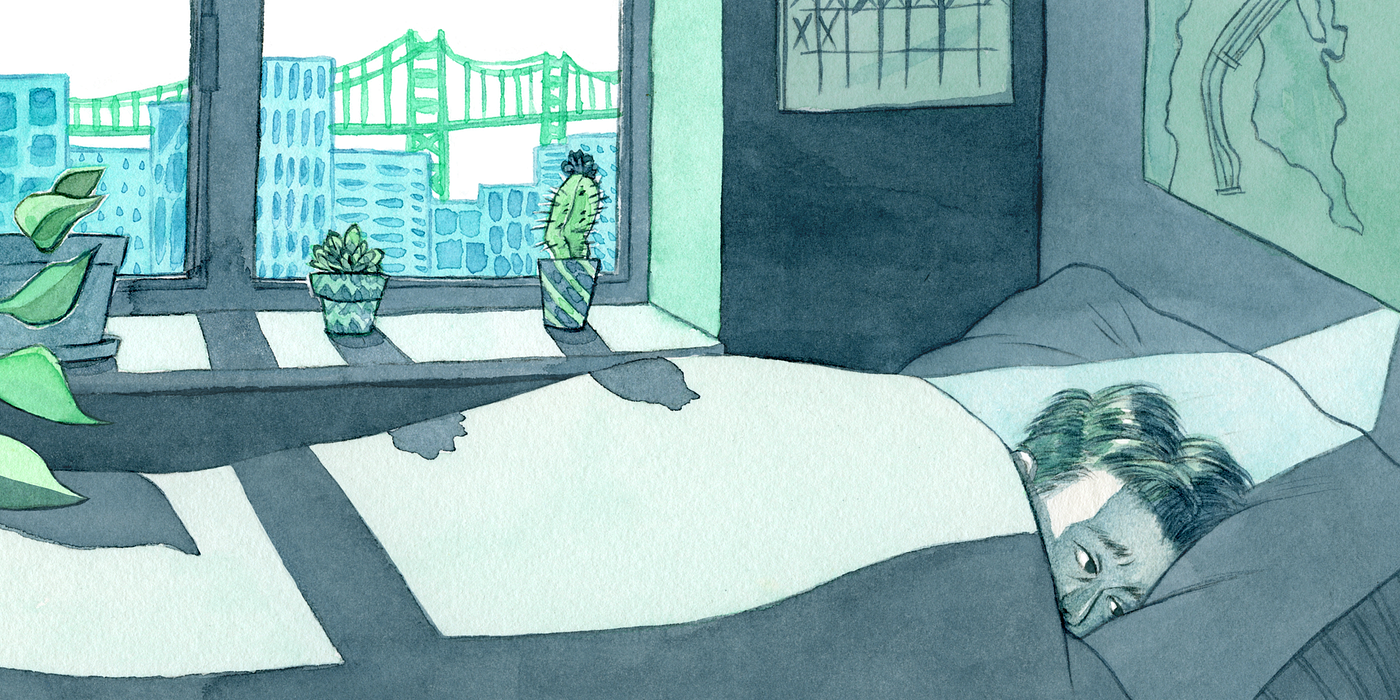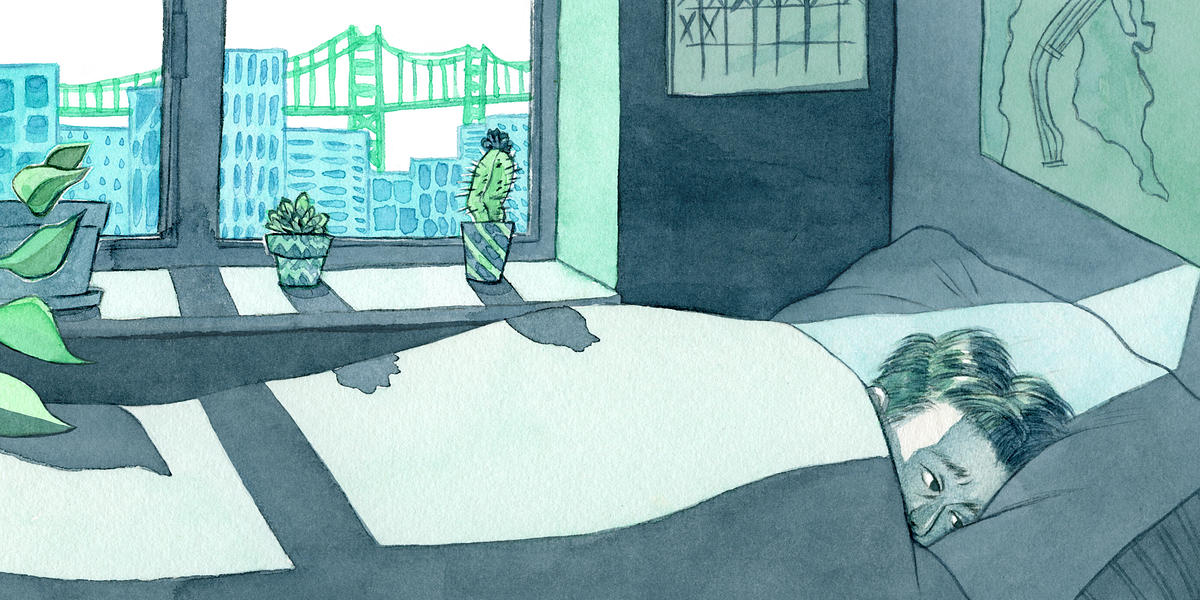By Caleb Pershan• Illustrated by Minnie Phan

I spent the worst summer of my life in San Francisco.
An East Coaster living with a distant relative in Ashbury Heights before my senior year of high school, I taught summer school in the Western Addition. But to be honest, I spent most of the summer in bed, inexplicably exhausted and unable to explore the city. I thought I was sad because of a breakup and berated myself for my loneliness and lack of energy.
Mustering the courage to visit the Golden Gate Bridge one morning, I looked out at the fog and thought, as many have, that I might jump into it. I didn’t have the vigor to really come close, but it’s the first suicidal thought I can remember.
About 1,600 people have killed themselves by jumping off the Golden Gate Bridge since it opened in 1937. Today a sign reads, “CRISIS COUNSELING / THERE IS HOPE / MAKE THE CALL / THE CONSEQUENCES OF JUMPING FROM THIS BRIDGE ARE FATAL AND TRAGIC.”
My depression wasn’t diagnosed until a year later. College applications and the prospect of leaving home left me anxious to a breaking point, but at first I accepted this as natural. Not yet able to vocalize my torment, I broke windows and slammed doors when I wasn’t collapsed on the bathroom floor, crying endlessly.
Mustering the courage to visit the Golden Gate Bridge one morning, I looked out at the fog and thought, as many have, that I might jump into it.
Finally, when I threatened to commit suicide in more and less subtle ways, my parents sent me to therapy for the first time. Still convinced that I felt terrible because I was terrible, I resisted treatment. I hated my therapist, and after some sessions and not much improvement, I packed up for college on the condition that I meet with a new psychiatrist near campus.
I now believe that my parents’ love and concern as well as this doctor’s support saved my life. It’s strange to say, but his wisdom was among the most important aspects of my college experience. Our work together sometimes felt like a crazy independent study, and in his office I became a better thinker and student of emotions generally.
“Who am I to be depressed?” is a question I’ve asked myself in and out of therapy since before I could articulate it. Lucky in so many ways — lucky to have support, to live in San Francisco as I do now, to just be alive — why was I sad? Nothing, as far as I could tell, was actually wrong with my life, but I was sad in spells — sad when I should have been happy and sad in ways I couldn’t control.
“Who am I to be depressed?” is a question that contains many others, like “Am I unusually sad?” and “Do I have any right to be sad?” and “Is there something wrong with me?” and “Do I deserve this?” But seven years in weekly counseling — the last two with a psychologist in Pacific Heights — have taught me better. Now I recognize the trap in the question, one tightly sprung with devaluation and doubt. “Who am I to be depressed?” It’s the question of a depressed person, and that’s partly who I am.
Nothing, as far as I could tell, was actually wrong with my life, but I was sad in spells — sad when I should have been happy and sad in ways I couldn’t control.
Anyone who knows me knows I also love to laugh, usually too loudly and at my own jokes. And even my depression is sometimes ridiculous: I’m afraid of mundane tasks and small trips. In fact, for the longest time, I was afraid to visit San Francisco, frequently returning to the memory of that terrible summer.
So when I did come back to the Bay after college, it was with some trepidation. Could I find a good therapist here? Did San Francisco itself depress me? Could it, in fact, make me happy? Part of depression, however, is having moods not correlated to place or time. I’ve been depressed on vacation, while eating my favorite foods, and at one of America’s “happiest colleges.” Geography is no curse or cure.
What matters, mostly, is how I treat and think about myself. Have I checked in with my mood and faced my discontents? We ignore our feelings at our peril: they’re information about us, not instructions or orders. At my worst moments, I can’t stand to be alone, and I can’t stand to be with others. It’s then that I imagine myself shackled to myself, trying to make an escape like two prisoners on a chain gang. To get away, we’ve got to work together. If I’m thinking too critically of myself or blowing the criticism of others out of proportion, I simply ask myself, would I speak this way to a friend I loved?
When I talk about my depression, which I don’t do nearly enough, I’m frequently asked, “How do you know if you’re depressed or just sad? What if you’re upset for good reason?” “Grief,” writes Andrew Solomon in his seminal book The Noonday Demon, “is depression in proportion to circumstance; depression is grief out of proportion to circumstance.” If nothing’s happened but you’re so sad you can’t get out of bed, you’re depressed. Or if you get a diagnosis, like I did, you are. Unfortunately, there isn’t a test you can take by peeing in a cup.
Generally, I like to think of sadness and depression as analogous to weather and climate. You can be sad one day and sunny the next — that’s normal. But, to mix metaphors, if your life is one big rainstorm, and there isn’t a cloud in the sky, I hope you’ll seek help. Unfortunately, there’s a class element to depression: many of us live without insurance and access to help, and most insurance won’t cover therapy. I’m relieved that mine does. There are also support groups for those with mood disorders (such as Depression and Bipolar Support Alliance San Francisco) that can be wonderfully helpful.
If nothing’s happened but you’re so sad you can’t get out of bed, you’re depressed. Or if you get a diagnosis, like I did, you are. Unfortunately, there isn’t a test you can take by peeing in a cup.
Some have come to think of depression as purely chemical, a lack of serotonin that can be allayed with medication. But that isn’t it either. I’m on an antidepressant and expect to be for the rest of my life, despite my initial discomfort with it. My medicine works in conjunction with talk therapy, stabilizing me to the point where I can begin to sort myself out. Together, the two are much more powerful.
Even these days, though, as I’m strong enough to write about my history, I’m still depressed or in remission or however you’d like to put it. But I’m tired of keeping my struggle an exhausting secret. When we open ourselves up to the world, we see that we’re not so alone as we had feared we were.
I’ve returned many times to walk or bike across the Golden Gate Bridge, which is very fun (but bring a jacket). Every time, I read that posted sign. Depression makes suicide a false escape; it whispers that one’s life is already over. But depression is a liar. I’m endlessly relieved that I haven’t ended my life. I’ve lived to see the bright future that, for so long, I couldn’t make out through the fog.







